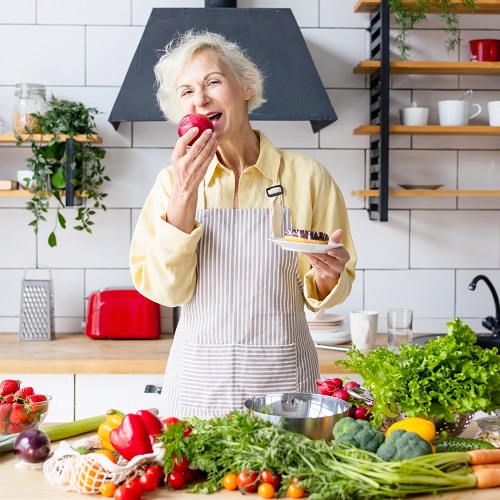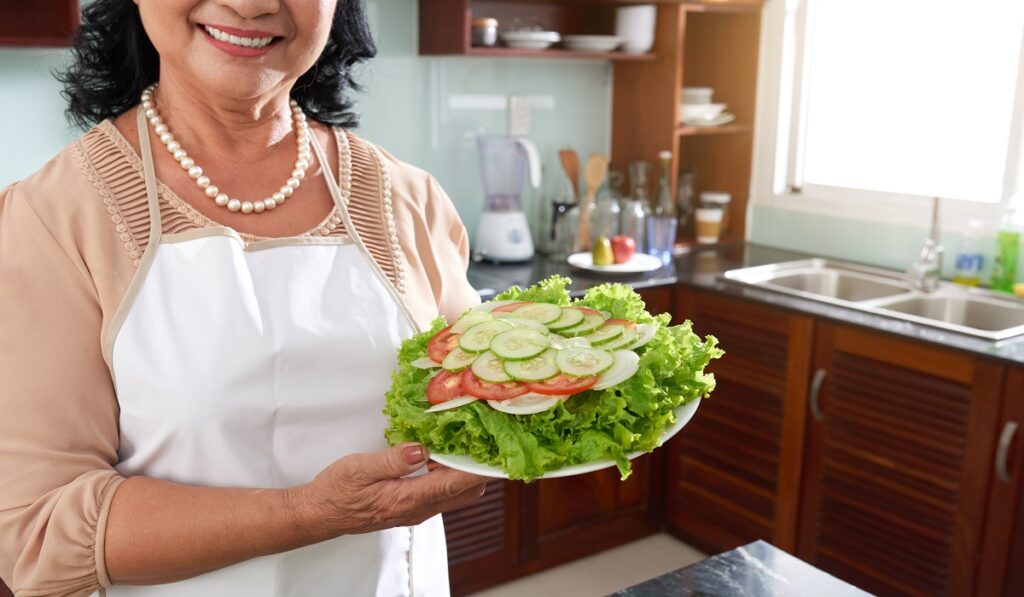For many of us, the kitchen holds a treasury of memories: the comforting aroma of a grandmother’s baking, the sizzle of a parent’s signature dish, or the shared laughter over a holiday meal. Cooking isn’t just about sustenance; it’s a fundamental part of our lives, woven into our culture, traditions, and family bonds. However, as we age, the joy of cooking can sometimes fade. Physical limitations, decreased appetite, or simply the effort of preparing meals for one can make the kitchen feel less inviting. Yet, understanding the profound cooking benefits for seniors is crucial.
This article will explore how engaging in culinary activities offers far more than just nourishment, igniting joy, fostering independence, and enriching overall well-being. At Serenity Living Home Care, we deeply understand and champion these invaluable advantages.
Key Takeaways
- Cooking boosts memory and mental agility by engaging attention, sequencing, and problem-solving skills.
- Kitchen tasks support physical health through gentle movements that enhance dexterity and mobility.
- Preparing meals reduces stress and loneliness, offering emotional comfort and social connection.
- Cooking stimulates appetite and encourages better nutrition through hands-on involvement.

Cognitive & Creative Stimulation
The kitchen is a fantastic playground for the brain, offering a dynamic environment that engages multiple cognitive functions. Far from being a simple chore, cooking is a complex activity that stimulates the mind in various ways.
When seniors follow a recipe, they’re not just reading instructions; they’re actively recalling steps, remembering ingredient amounts, and sequencing tasks. This process inherently helps to strengthen senior memory, acting as a delightful form of mental exercise. Does cooking help senior memory? Absolutely. The intricate steps—from measuring and mixing to timing and temperature control—demand focus and problem-solving skills, keeping the brain agile and engaged.
Beyond the technical aspects, cooking is a powerful outlet for creativity. Deciding on flavors, experimenting with spices, arranging food beautifully, or even adapting a family recipe to new dietary needs, all tap into a senior’s imaginative spirit. For those experiencing cognitive changes, engaging in creative kitchen tasks for seniors with dementia can be profoundly therapeutic. Familiar smells and textures can trigger cherished memories, offering moments of connection and comfort. It’s a gentle yet effective way to maintain cognitive function and foster a sense of purpose.
Research supports these benefits: a 12-week cooking program based on brain-activating rehabilitation principles showed that cooking can reduce behavioral and psychological symptoms of dementia and maintain executive function in elderly residents.
Physical & Therapeutic Advantages
The physical acts involved in cooking offer a surprising array of therapeutic benefits, contributing to mobility, dexterity, and overall strength in older adults. It’s an enjoyable way to incorporate gentle, functional movement into daily life.
Consider the various movements involved. Tasks like chopping vegetables, kneading dough, stirring pots, and cracking eggs all improve fine motor skills, hand-eye coordination, and gentle mobility. This consistent engagement directly demonstrates how cooking improves senior dexterity. For seniors requiring focused physical engagement, integrating culinary activities can act as an engaging form of cooking for physical therapy elderly.
Here are just a few examples of kitchen tasks that offer physical benefits:
- Chopping & Slicing: Improves hand strength, grip, and precision.
- Stirring & Mixing: Engages arm and shoulder muscles, enhancing range of motion.
- Kneading Dough: Excellent for hand and forearm strength, and tactile stimulation.
- Reaching & Bending: Accessing ingredients from cupboards or ovens promotes flexibility and balance.
- Washing Dishes by Hand: A simple task that engages arm muscles and dexterity.
These purposeful movements contribute to greater physical confidence and capability, often without even feeling like exercise.
Social & Emotional Well-being
Cooking has a unique ability to bring people together, fostering deep social connections and contributing significantly to emotional well-being. It’s an activity that naturally lends itself to sharing, storytelling, and companionship.
The act of preparing a meal, especially when shared, cultivates a profound sense of accomplishment and purpose. Successfully baking a cake or cooking a favorite dish can significantly boost mood through cooking for seniors, reducing feelings of stress and enhancing self-esteem. The focused nature of cooking can also serve as a mindful activity, drawing attention away from worries and into the present moment.
Beyond personal satisfaction, cooking is a powerful catalyst for social interaction. Shared cooking activities for elderly bonding can create lively, interactive environments, whether it’s a family member helping out, or residents preparing a meal together in a communal kitchen. These moments foster conversation, laughter, and a profound sense of belonging, directly contributing to the social benefits of cooking for seniors and combating loneliness.
Nourishment & Nurturing: Appetite, Nutrition & Independence
Perhaps one of the most direct advantages, cooking empowers seniors to take control of their nutritional health and maintain vital independence. It’s about more than just eating; it’s about making conscious, healthy choices.
A common challenge for older adults is a decreased appetite. However, the sensory experience of cooking—the enticing aromas, the vibrant colors of fresh ingredients—can often stimulate a renewed desire to eat. Actively participating in meal preparation can be a powerful tool for boosting appetite in elderly naturally.
Furthermore, preparing one’s own meals provides unparalleled control over diet and nutrition. Seniors can select fresh, wholesome ingredients, manage portion sizes, and adapt recipes to specific dietary needs or preferences, ensuring they receive balanced and healthy nourishment. This ability to make informed choices and prepare personal meals is a cornerstone of cooking for independence in later life, providing a tangible way to maintain autonomy and a sense of self-sufficiency.
Cooking and baking can enhance nutrition, increase appetite, and help maintain a sense of independence among older adults, according to MDPI.
The Serenity Living Kitchen: Fostering Culinary Joy & Wellness
At Serenity Living Home Care, we deeply understand and embrace the myriad cooking benefits for seniors. Our philosophy centers on creating an environment where residents can continue to experience these joys and maintain their independence through culinary engagement.
Our compassionate and trained staff are always available to provide support, whether it’s assisting with meal preparation, helping with grocery shopping, or simply supervising to ensure a comfortable and secure experience. We believe in empowering residents to continue beloved activities, not just doing things for them.
We actively promote engaging cooking activities for seniors, from hands-on baking clubs and themed meal preparations to interactive cooking demonstrations. These programs are designed to be inclusive, fun, and therapeutic, ensuring there are always “simple kitchen activities for seniors” available. Our goal is to keep older adults active in the kitchen and foster a sense of purpose through meaningful engagement. From “fun kitchen tasks for seniors” to more involved culinary projects, we provide opportunities for everyone to participate at their comfort level.
Conclusion
The cooking benefits for seniors are truly transformative. From sharpening minds and strengthening bodies to fostering deep social connections and nurturing independence, the act of preparing food offers a holistic pathway to enhanced well-being and joy in later life. It’s a powerful reminder that our kitchens are not just places where we make meals, but where we cultivate vitality, purpose, and lasting memories.
At Serenity Living Home Care, we are committed to providing an environment where these vital culinary experiences are celebrated and supported. We invite you to discover how our dedicated team and vibrant community can help your loved one continue to enjoy the profound benefits of cooking, leading a fulfilling and purposeful life. Contact us today to learn more or schedule a personal visit.
Frequently Asked Questions about Cooking Benefits for Seniors
Is cooking good for the elderly?
Yes, cooking is beneficial for the elderly. It promotes independence, provides mental stimulation, and supports a healthy routine.
How does cooking benefit people?
Cooking helps with cognitive engagement, emotional well-being, and nutritional control. It can also be a therapeutic and social activity.
What are the advantages of cooking?
It improves nutrition, reduces stress, enhances creativity, and gives a sense of purpose—especially valuable for older adults.
What to cook for seniors?
Focus on easy-to-chew, nutrient-rich meals like soups, steamed vegetables, soft proteins, and fiber-rich whole grains.
Is cooking good for dementia?
Yes, with supervision. Simple cooking tasks can help dementia patients stay mentally active, feel useful, and recall familiar routines.


